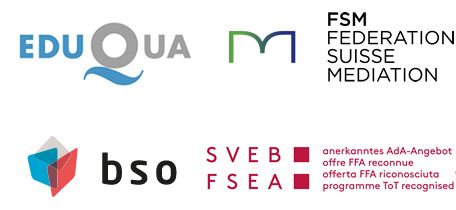Kommunikation und Persönlichkeit (MBTI)
Sich selbst und andere besser verstehen mit dem Myers-Briggs Typenindikator (MBTI)
Der Myers-Briggs Typenindikator (MBTI) gehört zu den bekanntesten Persönlichkeitstypologien, vor allem im englischsprachigen Raum. Der MBTI nach Katharine Cook Briggs und Isabel Briggs Meyers baut auf der Persönlichkeitstypologie von Carl Gustav Jung auf und teilt anhand von vier Dimensionen Menschen in 16 Persönlichkeitstypen ein.
Der MBTI bietet eine tiefgehende Grundlage, um das eigene Denken, Handeln und Kommunizieren besser zu verstehen und die Perspektiven anderer Menschen wertschätzend zu betrachten.

In diesem Kurs lernen die Teilnehmenden, wie sie Ihre persönlichen Stärken und Entwicklungsfelder identifi-zieren, Ihre zwischenmenschliche Kommunikation verbessern und effektiv mit verschiedenen Persönlichkeitstypen interagieren können.
Richtig angewandt, d.h. mit dem nötigen Grundwissen in Bezug auf die Präferenzhierarchie der verwendeten kognitiven Prozesse, ist der MBTI auch ein nützliches Instrument, sich selbst besser zu verstehen, Informationen besser einordnen und wichtige Entscheide besser treffen zu können. Die individuellen Präferenzen der kognitiven Prozesse hat eine grosse Auswirkung auf die Art und Weise wie wir kommunizieren, mit wem wir uns verstehen und mit wem wir Gefahr laufen, aneinander vorbeizureden.
Lerninhalte
- Einführung in die Myers-Briggs Persönlichkeitstypologie
- Kennenlernen der 16 Persönlichkeitstypen
- Klärung der Dimensionen, Dichotomien und Begriffen des MBTI
- Einführung in die unterschiedlichen kognitiven Prozesse
- Kritisches Eruieren des eigenen Persönlichkeitstypus
- Erkennen der eigenen Strategien in Bezug auf Informationsverarbeitung und Entscheidungsprozesse
- Eruieren der eigenen Präferenzhierarchie
- Reflexion über die eigenen Präferenzen und deren Einfluss auf persönliche und berufliche Kontexte
- Strategien zur Verbesserung der Kommunikation und Zusammenarbeit mit unterschiedlichen Typen
- Förderung von Empathie und Verständnis in zwischenmenschlichen Beziehungen
Lernziele
Ziel dieses Kurses ist es, die eigenen kognitiven Prozesse und deren Einwirkung auf unser soziales Verhalten einordnen und verstehen zu können. Nach Abschluss dieses Kurses werden die Teilnehmenden
- ihre eigene Persönlichkeit und die zugrunde liegenden Präferenzen besser verstehen.
- Kompetenzen zur wertschätzenden Kommunikation mit Menschen unterschiedlicher Persönlichkeitstypen erworben haben.
- ihre Fähigkeit zur Konfliktlösung und Beziehungsförderung durch ein tieferes Verständnis von Vielfalt in Denk- und Verhaltensmustern verbessert haben.
- in der Lage sein, den MBTI als Werkzeug für persönliche Weiterentwicklung und Teambildung gezielt einzusetzen.
Zielgruppe
Dieser Kurs richtet sich an alle, die ihre Selbst- und Sozialkompetenz stärken, ihre Kommunikation verbessern und die Zusammenarbeit in Teams optimieren und sich wertvolle Impulse für den Beruf und Alltag aneignen möchten. Angesprochen sind insbesondere auch Führungs- und Fachkräfte, die in einer Leitungs- oder Anleitungsfunktion die Zusammenarbeit und Kommunikation mit Teammitgliedern harmonisieren und verbessern wollen.
Thema | perspectiva Kommunikation: Kommunikation und Persönlichkeit (MBTI) Sich selbst und andere besser verstehen mit dem Myers-Briggs Typenindikator (MBTI) |
Dauer | 1 Tag |
Leitung | |
Ort | Ausbildungsinstitut perspectiva in Basel: Auberg 9 | 4051 Basel Hier gehts zum Situationsplan Basel |
Details |



